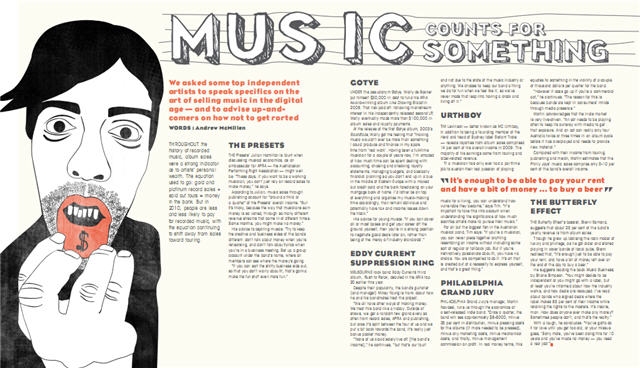The Weekend Australian book review: ‘Jacked: The Unauthorised Behind-the-Scenes Story of Grand Theft Auto’ by David Kushner, April 2012
A book review for The Weekend Australian, published on April 14 2012. The review appears below in its entirety.
Grand Theft Auto’s makers are rock stars in a world of geeks
by Andrew McMillenJacked: The Unauthorised Behind-the-Scenes Story of Grand Theft Auto
By David Kushner
HarperCollins, 368pp, $29.99
‘GRAND Theft Auto revolutionised an industry, defined one generation, and pissed off another, transforming a medium long thought of as kids’ stuff into something culturally relevant, darkly funny, and wildly free,” David Kushner writes in his second video game-themed book.
His first was Masters of Doom in 2003, which looked at Nazi and demon-shooting games such as Wolfenstein 3D, Doom and Quake.
Here, Kushner focuses on the GTA series, which casts players “at the centre of their own criminal universe”, to quote the game’s Scottish creator, Sam Houser. Since its 1997 debut, GTA has courted controversy by allowing players to do whatever they please. Originally set in an urban environment viewed from above, the concept moved into three dimensions in 2001 with the release of GTA III on the Sony PlayStation 2. This proved to be the franchise’s breakthrough: from a camera positioned a few metres over the shoulder of the player-controlled character, gamers could follow the laws of the game world – which mirrored real life – if they so pleased.
Nobody did that for more than a few moments, though, because breaking the law was much more enjoyable: stealing vehicles, running down pedestrians, firing weapons into crowds of people, leading the police on elaborate cross-country car chases after gunning down officers in cold blood. The series has sold more than 130 million copies worldwide; four GTA games have been banned or censored in Australia at some point.
All the things you’d never do in real life, GTA made possible. Kushner describes it as a “brilliantly open world to explore”, where unlike other, comparatively plain video games, “there was no high score to hit or princess to be saved”. Jacked – a title that refers to the in-game ability to carjack – charts the evolution of the team behind the initial game through to their rebranding as Rockstar Games, which is one of the most respected names in the industry. It also examines the shockwaves that GTA’s law-defying gameplay sent through Western culture.
“It’s hard to understand those who came of age at the turn of the millennium without understanding GTA,” Kushner writes.
I was nine when I played the first game and 16 when I bought GTA: San Andreas on release in 2004. I’ve invested thousands of hours into exploring intricately detailed virtual re-creations of Miami, Las Vegas, New York and Los Angeles. It’s evident that Kushner, too, is a big fan, despite his preference for a dispassionate, omnipresent style of narrative nonfiction.
Though the author has spoken at length with seemingly everyone who had anything to do with the games, many of his book’s significant scenes are exaggerated for dramatic purposes. Although they took place in reality, Kushner’s poetic licence is occasionally jarring.
In this example, Kushner writes from the perspective of a Miami attorney named Jack Thompson, who became one of GTA’s most strident critics and opponents (before being disbarred for professional misconduct):
“Thompson examined the video game box in his hand. The cover was broken into frames like a comic book — flaming cars, a girl in a pink bikini, a black guy with a big gold chain and a gun. He eyed the tiny little logo in the bottom-right corner, the yellow square with the letter R and the star. Rockstar Games? Get ready to be Jacked.”
The narrative doesn’t benefit from these attempted flights of fancy, nor do we need Kushner’s frequent, tacky reminders that the members of the development team at Rockstar were, in fact, rock stars in an industry established by geeks. “Part of what we’re trying to get away from is the lone, girlfriendless, pizza-ordering fat guy in the basement,” GTA’s marketing director says at one point.
Yet Rockstar Games is portrayed as a company full of narcissistic, arrogant wankers. Houser modelled the company on his favourite music label, Def Jam Records. He sold T-shirts and stickers bearing the studio’s name. His employees exhibited behaviour somewhere between extreme devotion and cult-like worship: they wore branded tracksuits and military jackets at industry trade shows; they’d shave their heads during “crunch” time in the lead-up to a game’s release.
When it came to the media, “ego trumped economics”: the PR team would abuse publications for awarding GTA games anything less than perfect scores, and threaten to pull ads.
These insights into Rockstar’s inner workings are the highlights of a strong, if flawed, tale about this generation’s most influential video game series. Kushner’s well-researched book will appeal to gamers and those looking to understand how gaming came of age after being dragged kicking and screaming, with the release of each subsequent Rockstar game.
Andrew McMillen is a Brisbane-based freelance journalist.
